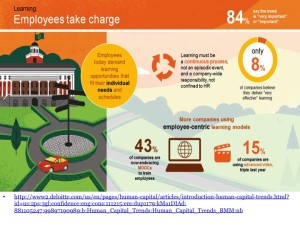Quality and skill are becoming less important as more and more employees look for ease in the workplace. Consider the following research:
45 % of employees aspire to achieve work/life balance, which is more than double the number of employees that rank being the best at what they do (17 %) as their top career aspiration.
In Europe, 55 % of employees aspire for work/life balance, followed by Asia Pacific (37 %) and North America (35 %).
Interestingly, millennials (14 %) are least likely to aspire to be the best at what they do compared to Baby Boomers (22 %) and Gen X (17 %).
Only 3 % of employees globally aspire to achieve a prominent position.
Right Management’s Global Career Aspiration Survey
Leadership Lesson: There is much discussion today about whether the American dream is dead. One of the key components in achieving that dream is the willingness to work hard, do the best one can possibly do and believe that one day that hard work and quality will be recognized and rewarded. Many people come to this country and model these beliefs. They are willing to work and do what is necessary to achieve that dream for themselves and their families.
The unfortunate fact is many of our citizens no longer hold or believe these values. The entitlement mentality has so focused on rights that responsibilities are forgotten. Rather than serving others, the “me first” society has placed the individual at the center of attention. (Of course theism is not rue of the leaders over us; we expect them to serve us!)
The raising of our children has focused on protecting them from hardships and failures – everything should always turn out all right. So parents defend their children from the tyranny of authority rather than let them learn to deal with hardship and disappointment. Situational ethics so permeates the educational culture that any action can be justified in any situation with just a little maneuvering.
Make no mistake, the attitudes, values, beliefs and philosophy that developed over years in the homes and schools are now entering the workplace. For many, business has become their religion; it is expected to fulfill their yearnings and meet their needs: provide meaning in life; provide values (that the employee approves of); make up for the educational deficiencies of the school systems; provide growth and motivation in interesting and challenging work assignments; treat me like I have talent even when I don’t: treat everything that is said as significant and important because all views are valuable; deliver perfect leadership which never tells me “no”; and, never, never, never give negative feedback,
As a result we see organizations try to adapt. Recently I read Deloitte’s Human Capital Trends 2016 research, view of the changing nature of work. In the slide below they suggest how organizations of the future will “craft the employee experience.
Note Deliotte’s comment, “Employees today demand learning opportunities that fit their individual needs and schedules.”
We find the same philosophy behind holocracy that attempts to remove the insidious evil of management out of an employee’s life. The employee wants to be in charge sol lets design an organization that allows that to happen.
This philosophy of the organization responding and adapting to the changing employee permeates Deliotte’s findings. In the past new employees into the workforce adapted to how businesses operated. Today that is reversed. The lesson is crystal clear: what is happening in our society is impacting business as never before.
One thing we know for sure. Employees who have been indoctrinated under the philosophy of entitlement in which they have been constantly told they are the center of the universe will have difficulty when they are asked be part of a team. Maybe they will be successful when things go well but what about when they don’t get their way No matter how the organization attempts to change and adapt, there will always be a demand for more customization to what the individual wants. Molding these kinds of attitudes into beliefs into a team is the new leadership challenge. If that is the case we better develop significant competencies in conflict resolution for the few leaders who are remain.
Copyright 9 By 9 solutions 2016 All Rights Reserved
